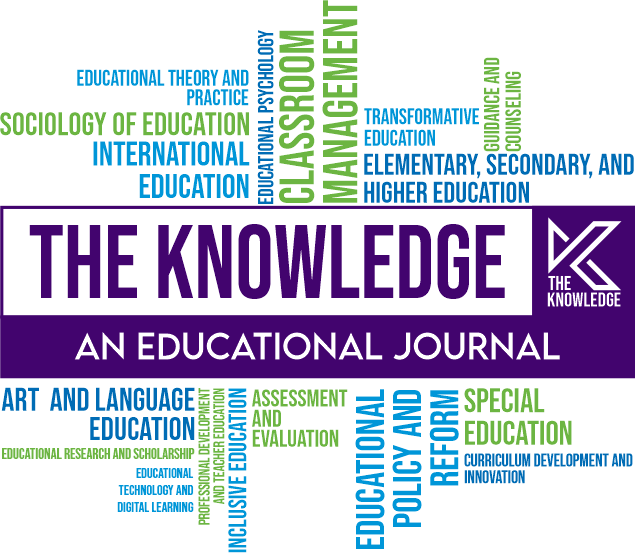Impact of Teachers’ Technology Integration in Blended Learning on Students’ Active Participation and Academic Performance at University Level
DOI:
https://doi.org/10.63062/tk/2k25a.41037Keywords:
Blended Learning, Technology Integratio, Active Participation, Academic Performance, Higher Education, University Students, Quantitative Research, Linear Regression, Khyber PakhtunkhwaAbstract
This study examines the "Impact of Teachers' Technology Integration in Blended Learning on Students' Active Participation and Academic Performance at the University Level" in southern Khyber Pakhtunkhwa. Using a descriptive and quantitative research design, the study focuses on BS, M.Phil., and Ph.D. students from five universities in the region, with a population of 2,861. A sample of 341 students was selected through stratified random sampling, and data was collected via a 5-point Likert scale questionnaire, achieving a 94% response rate. Linear regression analysis was used to test two hypotheses: (1) whether teachers' technology integration has no significant effect on students' active participation, and (2) whether it has no impact on academic performance. The findings aim to provide valuable insights for educators, curriculum developers, and policymakers to enhance blended learning strategies, foster student engagement, and improve learning outcomes. The study is geographically limited to southern Khyber Pakhtunkhwa, ensuring context-specific recommendations for improving technology-integrated education in the region.
References
Bonk, C. J., & Graham, C. R. (2012). The handbook of blended learning: Global perspectives, local designs. Wiley+ ORM.
Çalış, Ş., Tan, E., Maç, S. D., & Turan, Ş. A. (2022). A critique of the internship measurement scales in higher education. Educational Research Review, 37, 100491. https://doi.org/10.1016/j.edurev.2022.100491
Dziuban, C., Graham, C. R., Moskal, P. D., Norberg, A., & Sicilia, N. (2018). Blended learning: the new normal and emerging technologies. International Journal of Educational Technology in Higher Education, 15(1), 1–16. https://doi.org/10.1186/s41239-017-0087-5
Fernández-Batanero, J. M., Montenegro-Rueda, M., Fernández-Cerero, J., & García-Martínez, I. (2020). Digital competences for teacher professional development. Systematic review. European Journal of Teacher Education, 45(4), 513-531. https://doi.org/10.1080/02619768.2020.1827389
Graham, C. R. (2013). Emerging practice and research in blended learning. In Handbook of distance education (pp. 351-368). Routledge.
Graham, C. R., Woodfield, W., & Harrison, J. B. (2013). A framework for institutional adoption and implementation of blended learning in higher education. The Internet and Higher Education, 18, 4-14. https://doi.org/10.1016/j.iheduc.2012.09.003
Horn, M. B., & Staker, H. (2014). Blended: Using disruptive innovation to improve schools. John Wiley & Sons.
Hrastinski, S. (2019). What do we mean by blended learning? TechTrends, 63(5), 564-569. https://doi.org/10.1007/s11528-019-00375-5
Hwang, G., Xie, H., Wah, B. W., & Gašević, D. (2020). Vision, challenges, roles and research issues of artificial intelligence in education. Computers and Education: Artificial Intelligence, 1, 100001. https://doi.org/10.1016/j.caeai.2020.100001
Liu, Y., Ma, S., & Chen, Y. (2024). The impacts of learning motivation, emotional engagement, and psychological capital on academic performance in a blended learning university course. Frontiers in Psychology, 15. https://doi.org/10.3389/fpsyg.2024.1357936
Poulin, R., & Straut, T. T. (2016). WCET Distance Education Enrollment Report 2016: Utilizing US Department of Education Data. WICHE Cooperative for Educational Technologies (WCET).
Sailer, M., & Homner, L. (2019). The Gamification of learning: A meta-analysis. Educational Psychology Review, 32(1), 77-112. https://doi.org/10.1007/s10648-019-09498-w
Scherer, R., Howard, S. K., Tondeur, J., & Siddiq, F. (2021). Profiling teachers' readiness for online teaching and learning in higher education: Who's ready? Computers in Human Behavior, 118, 106675. https://doi.org/10.1016/j.chb.2020.106675
Vaughan, N. D., Dell, D., Cleveland-Innes, M., & Garrison, D. R. (2023). Principles of blended learning: Shared metacognition and communities of inquiry. In Principles of Blended Learning. Athabasca University Press.
Vaughan, N., Graham, C., Dziuban, C., & Teodoro, V. D. (2018), Blended learning in higher education: research findings. https://educationaltechnologyjournal.springeropen.com/blhe
Xie, H., Chu, H., Hwang, G., & Wang, C. (2019). Trends and development in technology-enhanced adaptive/personalized learning: A systematic review of journal publications from
Downloads
Published
Issue
Section
License
Copyright (c) 2025 Copyright in the THE KNOWLEDGE is retained by the author(s). Authors also grant any third party the right to use the article freely as long as its integrity is maintained and its original authors, citation details and publisher are identified.
This work is licensed under a Creative Commons Attribution-NonCommercial 4.0 International License.







